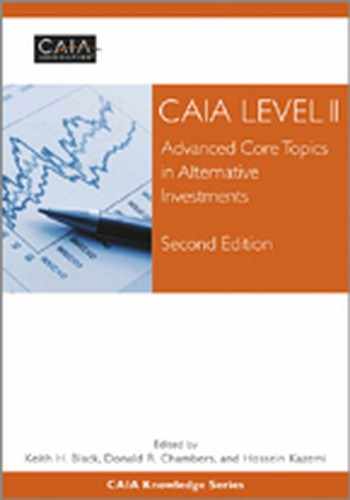32.9 INVESTMENT AND OPERATIONAL DUE DILIGENCE PROCESSES
After analyzing individual managers, both qualitatively and quantitatively, most firms eventually proceed to a formal investment recommendation. While investment firms, such as funds of funds, have proprietary, formal processes for recording these recommendations, most would include:
- General manager information
- Name of firm and contact information
- Name of specific investment fund/product being recommended
- Assets under management of the firm and the fund/product
- Description of the management company and regulatory registrations
- Biographical information of key staff
- Investment references
- Description of the investment strategy, including markets traded, liquidity, time frames, and full discussion of investment style
- Quantitative review of the investment strategy
- Discussion of investment risk
- Discussion of current portfolio activities
- Subscription/redemption terms of the fund along with its fee structure, and information about whether investments can be “side pocketed” or redemption restrictions (gates) imposed
- Specific amounts to be invested
- Evidence of investment recommendation approval (i.e., authorized signature)
Again, the specific information and level of detail included in a formal investment recommendation differs from firm to firm. However, the existence of a formal process, backed by independent due diligence, is widely felt to be a required best practice in the industry.
Firms, such as funds of funds, have increasingly separated investment due diligence from operational due diligence. An operational due diligence review focuses on the legal documents of an investment vehicle as well as the back office operations and trading systems of an investment firm. The skills required for an operational due diligence review, such as legal, accounting, and operational risk assessment, often differ from those used to assess the investment strategy of a manager. Investment due diligence, which assesses the investment strategy, will require knowledge of markets as well as the macroeconomic environment, and involve a fair degree of sophisticated quantitative analysis. These are different skills than those required to review managers' documents or accounting systems.
The formal due diligence process begins with a review of all of the documents and counterparties involved in an individual investment. It also includes a review of the internal procedures of the investment manager. As an example, the operational due diligence process is likely to review the following fund documents:
- Offering documents: Offshore and onshore hedge funds are marketed to investors through an offering document, referred to as an Offering Memorandum or Private Placement Memorandum. This document summarizes the terms of the investment product, including a description of the fund's structure (e.g., where it is domiciled, what laws govern it, and whether it is listed on an exchange), as well as investment goals and objectives, management team, fees and expenses, and subscription and redemption terms. The offering document serves a marketing purpose and is not the legally operative document of a fund.
- Subscription agreement: Investors in a hedge fund need to complete a subscription agreement. This includes detailed information about the investor. As anti-money-laundering rules have been adopted in many legal jurisdictions, subscription agreements have increasingly asked for proof of the investor's identity. In the case of U.S. investment products, subscription agreements include a number of questions designed to ascertain whether the investor is qualified, that is, whether the investor has sufficient income and/or assets to legally qualify as eligible to participate in certain investments.
- Redemption form: A redemption form, given to investors at the time of their initial investment, provides information about redemption terms and restrictions. Such information includes the frequency of allowed redemptions (e.g., monthly, quarterly, or annually); the notice period required for a redemption (e.g., 90 days before the redemption date); special terms, such as whether a penalty can be imposed on redemptions of investments not held for minimum periods of time (e.g., a 5% redemption penalty on investments held less than one year); and lockup periods (e.g., periods of time after the initial investment during which no redemption is permitted), as well as whether redemptions may be suspended and, if so, under what conditions.
- Investment advisory agreement: For offshore funds, the investment manager signs an investment advisory agreement with the fund itself. The agreement describes the obligations of the investment manager with regard to the investment vehicle. In the case of a U.S. limited partnership, the investment manager typically acts as the general partner, and the obligations are set forth in the partnership agreement.
- Administration agreement: Most offshore funds, and increasing numbers of U.S. limited partnerships, use outside administrators for certain tasks. Such tasks include receiving subscriptions into the funds and paying out redemptions. In addition, and importantly, administrators are also responsible for valuing the fund on a periodic basis, most commonly on a monthly basis. For managed futures, this valuation process is normally straightforward, since most of the instruments traded are readily priced on a transparent futures exchange.
- Audited financial statements: Both offshore funds and onshore partnerships undertake an annual audit. These audits are provided to current and prospective investors. It is common for prospective investors to request at least three years of audits prior to formally deciding to invest. These audits are reviewed to verify information provided by the manager, to assure that there is an unqualified audit letter, and to discern whether there has been a change in auditor over this period. While there are often simple explanations as to why an auditor has been replaced, prospective investors usually wish to discuss the reasons with a manager, and often with the audit firm directly.
